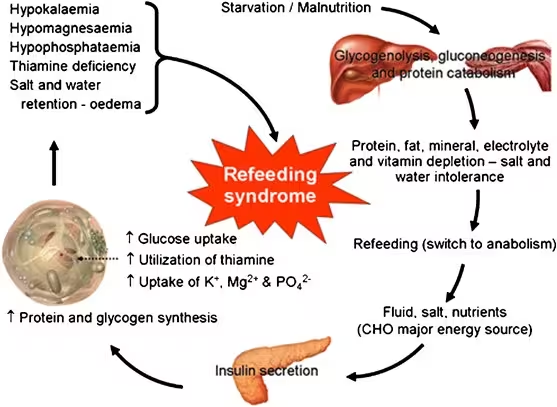Re-feeding syndrome is a serious metabolic complication that can occur when malnourished individuals are reintroduced to food or nutrition too quickly. It happens because the body’s metabolism undergoes significant changes during malnutrition leading to severe electrolyte and fluid shifts. This condition is characterised by rapid changes in phosphate, potassium, and magnesium levels.
Risk Factors
- Severe Malnutrition: Individuals with severe malnutrition due to eating disorders (anorexia nervosa, bulimia nervosa), prolonged starvation/ fasting, critical illness, or digestive disorders are most susceptible
- Prolonged Intravenous Feeding: Without proper monitoring of electrolytes.
Pathophysiology
- Starvation State: During prolonged starvation, the body adapts by reducing insulin secretion and increasing fat metabolism.
- Re-feeding: Introduction of carbohydrates leads to increased insulin secretion.
- Electrolyte Imbalance: Insulin promotes cellular uptake of glucose and electrolytes (phosphate, potassium, magnesium), depleting them from the blood.

Complications
Refeeding syndrome can lead to several severe complications due to the rapid shifts in electrolytes and fluids:
- Electrolyte Imbalances:
- Hypophosphataemia: Muscle weakness, respiratory failure, cardiac dysfunction, rhabdomyolysis.
- Hypokalaemia: Cardiac arrhythmias, muscle weakness, paralysis.
- Hypomagnesaemia: Neuromuscular disturbances, tetany, seizures, cardiac arrhythmias.
- Fluid Imbalances:
- Oedema: Fluid overload, heart failure.
- Hyperglycaemia: Increased blood sugar levels, potential for osmotic diuresis leading to dehydration.
- Organ Dysfunction:
- Cardiac Complications: Heart failure due to electrolyte disturbances, cardiac arrest from severe arrhythmias.
- Respiratory Failure: Due to diaphragmatic weakness from electrolyte depletion.
- Neurological Symptoms: Seizures and altered mental status due to severe electrolyte imbalances.
Prevention and Management
- Identify At-Risk Individuals: Assess for malnutrition and associated risk factors.
- Gradual Refeeding: Start with low-calorie feeds, gradually increasing caloric intake while monitoring.
- Monitor Electrolytes: Regularly check serum levels of phosphate, potassium, magnesium, and glucose.
- Supplementation: Provide electrolyte supplements as needed to prevent imbalances.
- Close Monitoring: Continuous clinical and biochemical monitoring during the re-feeding process.
